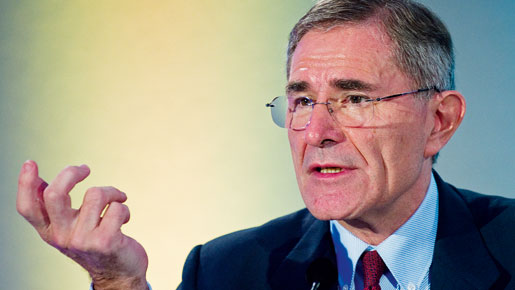
It’s a little-known fact that the London Olympics will not commence without 61-year-old Gérard Mestrallet, boss of the world’s biggest energy company, flicking the switch. So to speak, at least. That tells you just how big and powerful GDF Suez has become. It’s an absolute monster of a company, spanning natural gas and LNG, wind power, biomass, coal, oil and nuclear power.
You can also add solar energy to this list and GDF Suez is active right down the energy chain, from supply to production, exploration, infrastructure and environmental services. The biggest utility operator in the world, in fact. And Mestrallet’s company is in demand – and under considerable pressure too. The Asia-Pacific region is playing industrial catch-up on a huge scale while environmental concerns have embedded themselves as part of the corporate and commercial landscape.
Finger on the nuclear button
Despite the work load, Mestrallet – he originally trained as an aeronautical engineer – appears steady and focused (with this amount on his plate, you need to be). GDF Suez’s own history harks right back to the 1822 foundation of Société Générale des Pays-Bas by William of Orange and the 1858 creation in Paris by Ferdinand de Lesseps of the Universal Company, responsible for the Suez canal – a technical tour de force built with forced labour and, towards the end, steam-driven dredgers.
So what about recent successes? Under Mestrallet’s watch, the company has merged with six other companies, including Lyonnaise des Eaux, Gaz de France and UK-based International Power last year. No mistake, his company is a world-beater and Mestrallet is not shy about claiming credit for it. “You know, it wasn’t the government’s idea to create an international energy champion,” he said in an interview with the London Evening Standard in 2010. “It was my idea. But the [French] government accepted it”.
Indeed. However, since the Japanese Fukushima nuclear disaster and the terrible tsunami that killed thousands of Japanese civilians, new concern has surfaced about nuclear power. Is it safe? The energy boss appears confident. “At this stage, we haven’t yet learned the lessons [from the Japanese accident] and we don’t have a reason to change our strategy,” Mestrallet told the media shortly before we went to press. “Our strategy is to maintain in the long term the share of nuclear in the company’s overall portfolio”.
Brand buster
His strategy is also, of course, to maintain and build profits for shareholders. Despite a global recession and a slew of profit warnings, Mestrallet oversaw increased revenues from €4.48bn in 2009 to €4.62bn in 2010. Just about all its main business lines – including electricity, gas and environmental services – saw robust growth, enabling the company to hike its dividend to €1.5 per share.
For 2011, earnings of €17bn to €17.5bn – compared with €15.1bn in 2010 – are thought likely. Impressive. And if we get another bitterly cold winter in 2011-2012, profits could be higher still – French gas demand soared by 35 percent last year because of the freezing conditions much of Europe endured.
It’s branding is also strong: GDF Suez remains number one – for the third year running – in the Brand Finance Global 500 in the utilities sector, ahead of E.on and EDF. It’s also ranked number four among French companies, behind Orange, BNP Paribas and Axa.
Never overpay
Not a great deal is known about Mestrallet’s private life, though he remains married to his first wife, a keen horse rider with 60 horses. He earned his degree at the elite Paris-based École Polytechnique before attending the super-elite École Nationale d’Administration, the school for future government and corporate high-fliers. A middle child with one older and younger brother, he may appear laid back, quiet even. But behind his glasses, he’s watchful.
Witness his decision in 1995 when he took over Compagnie Financière de Suez. Did the group really need a financial arm? It was, it turned out, a very good time to sell. GDF Suez made billions from dumping financial services and used the cash to snap up Belgian energy giant Tractebel. Then, in May 1997, he masterminded his masterstroke: the merger with water utility Lyonnais des Eaux. That brought considerable international holdings with it. From then on GDF Suez would lead not just in energy but water too.
Despite huge success, some gains have taken their time. The integration of Gaz de France which demanded that the company be privatised, took almost a decade to pull off (with the government remaining as a sizeable shareholder). A lot of patient waiting and watching before striking – and striking hard.
Mestrallet is certainly mindful of his financial obligations. He never overpays. He avoids businesses he doesn’t understand or that have huge up-front costs (telecommunications, for example). And despite the huge, sprawling tentacles of this company, GDF Suez is actually highly streamlined and focused. And when things go wrong, Mestrallet doesn’t hang about. Given the nervousness about the N-word currently, his next moves will be closely watched.

